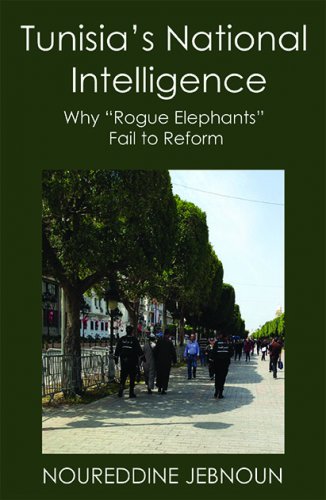
About the Author
NOUREDDINE JEBNOUN teaches at Georgetown University’s Center for Contemporary Arab Studies in the Edmund A. Walsh School of Foreign Service. Previously, in Tunisia, he served as professor of strategy and geopolitics at the National War College, the Command and Staff College, and the National Defense Institute (1998–2004), as well as a senior lecturer at the High Institute of Internal Security Forces (2000–2004). He is co-editor of and contributor to Modern Middle East Authoritarianism: Roots, Ramifications, and Crisis (Routledge, 2013 & 2015) and author of L’espace méditerranéen: les enjeux de la coopération et de la sécurité entre les rives nord et sud à l’aube du XXIème siècle [The Mediterranean Region: Implications of Security and Cooperation between the Northern and Southern Shores at the Dawn of the Twenty First Century] (NATO Defense College, 2003). His works have appeared in the Journal of North African Studies, Center for Contemporary Arab Studies Occasional Papers Series, Center for Muslim-Christian Understanding Occasional Papers, and as book chapters, among other publications. He holds a PhD in Political Science from the University of Paris I-Pantheon Sorbonne (1996).
TUNISIA’S NATIONAL INTELLIGENCE: Why “Rogue Elephants” Fail to Reform
Noureddine JebnounNew Academia Publishing, 2017
182 Pages
ISBN 978-0-9986433-2-8 Paperback
For BULK ORDERS, order directly from New Academia Publishing.
Queries: orders@newacademia.com
About the Author
NOUREDDINE JEBNOUN teaches at Georgetown University’s Center for Contemporary Arab Studies in the Edmund A. Walsh School of Foreign Service. Previously, in Tunisia, he served as professor of strategy and geopolitics at the National War College, the Command and Staff College, and the National Defense Institute (1998–2004), as well as a senior lecturer at the High Institute of Internal Security Forces (2000–2004). He is co-editor of and contributor to Modern Middle East Authoritarianism: Roots, Ramifications, and Crisis (Routledge, 2013 & 2015) and author of L’espace méditerranéen: les enjeux de la coopération et de la sécurité entre les rives nord et sud à l’aube du XXIème siècle [The Mediterranean Region: Implications of Security and Cooperation between the Northern and Southern Shores at the Dawn of the Twenty First Century] (NATO Defense College, 2003). His works have appeared in the Journal of North African Studies, Center for Contemporary Arab Studies Occasional Papers Series, Center for Muslim-Christian Understanding Occasional Papers, and as book chapters, among other publications. He holds a PhD in Political Science from the University of Paris I-Pantheon Sorbonne (1996).
About the book
This book has been published in association with
The Center for Contemporary Arab Studies, Georgetown University
Drawing on extensive fieldwork and original data, this book examines the political and security evolution of Tunisia’s national intelligence in the post-independence era. It investigates the sophistication of the intelligence complex under Bin ʿAlī and its central role in entrenching his authoritarian rule. The increased politicization of intelligence services contributed to the consolidation of power and the abuse of Tunisian citizens through the pervasive securitization of the public and private spheres and the intrusive penetration of society. The wide-range of illegal activities by Tunisia’s intelligence services contributed to the establishment of a police security state. However, these services played a critical role in its weakening through their lack of professionalism, their opacity, and their systematic use of intelligence for repression and oppression purposes. The post-uprising era created a new dilemma for intelligence organs in terms of their adjustment to the new socio-political context. The absence of appropriate political vision for the role of intelligence within a fledgling democracy, the rise of insecurity in the country and across the region, and the legacy of authoritarianism are hindering any effort to introduce an appropriate “reform.” The difficult transition of the intelligence apparatus’ habits of state-centric security, which has been associated with the regime’s security, to the human-citizen security approach, is likely a major impediment to such reform. Thus, rather than a reform that entails democratic control, accountability, and oversight of the intelligence sector, the country’s secret apparatus experienced a mending process seeking mainly to improve its operational capabilities driven by the discourse of technicalities.
Praise
“Jebnoun focuses on intelligence agencies, usually ignored in the political transitions literature, in his fascinating case study of Tunisia. As a former professor of its National War College, he is uniquely qualified to shed light on the labyrinth of dysfunctional services built up since 1956 and the need, unmet to date, to restructure them to be consonant with constitutional democracy.”
—Clement M. Henry, Professor Emeritus of Government and Middle East Studies
The University of Texas at Austin
“This comprehensive, detailed study of the Tunisian intelligence and security services provides unique insight into the deepest layer of that country’s deep state. Jebnoun’s analysis amply demonstrates that the persisting centrality of those services to successive regimes and their abiding powers bode ill for a democratic transition. Unfortunately, there are no equivalents to this pioneering study for other Arab countries.”
—Robert Springborg, Visiting Professor in the Department of War Studies at King’s College London Non-resident Research Fellow of the Italian Institute of International Affairs, Retired Professor of National Security Affairs at the Naval Postgraduate School, Monterey, CA
REVIEWS
https://www.tandfonline.com/doi/abs/10.1080/13530194.2017.1415860
https://muse.jhu.edu/article/693095
https://tandfonline.com/doi/abs/10.1080/00263206.2018.1472082?journalCode=fmes20
https://www.tandfonline.com/doi/full/10.1080/13629387.2018.1507460
https://www.tandfonline.com/doi/full/10.1080/18335330.2018.1504316?scroll=top&needAccess=true





 Coming Soon
Coming Soon Awards
Awards